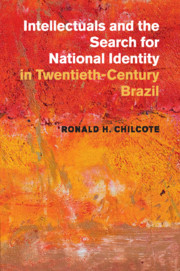Description
Intellectuals and the Search for National Identity in Twentieth-Century Brazil
Author: Chilcote Ronald H.
This book focuses on changing political thought in twentieth-century Brazil.
Language: English
Subject for Intellectuals and the Search for National Identity in...:
Approximative price 32.87 €
In Print (Delivery period: 14 days).
Add to cart
Intellectuals and the Search for National Identity in Twentieth-Century Brazil
Publication date: 11-2018
304 p. · 15.1x22.8 cm · Paperback
Publication date: 11-2018
304 p. · 15.1x22.8 cm · Paperback
Approximative price 83.99 €
In Print (Delivery period: 14 days).
Add to cart
Intellectuals and the Search for National Identity in Twentieth-Century Brazil
Publication date: 09-2014
Support: Print on demand
Publication date: 09-2014
Support: Print on demand
Description
/li>Contents
/li>Biography
/li>
This book discusses twentieth-century Brazilian political thought, arguing that while Rio de Janeiro intellectuals envisaged the state and the national bourgeoisie as the means to overcome dependency on foreign ideas and culture, São Paulo intellectuals looked to civil society and the establishment of new academic institutions in the search for national identity. Ronald H. Chilcote begins his study by outlining Brazilian intellectuals' attempt to transcend a sense of inferiority emanating from Brazilian colonialism and backwardness. Next, he traces the struggle for national identity in Rio de Janeiro through an account of how intellectuals of varying political persuasions united in search of a political ideology of national development. He then presents an analysis by São Paulo intellectuals on racial discrimination, social inequality, and class differentiation under early capitalism and industrialization. The book concludes with a discussion on how Brazilian intellectuals challenged foreign thinking about development through the state and representative democratic institutions, in contrast to popular and participatory democratic practices.
Introduction: the intellectual in theory and practice; 1. Intellectuals and political thought in twentieth-century Brazil; 2. Developmental nationalism and the Rio movement; 3. Nationalism and Marxism in the São Paulo movement; 4. Capitalism and the bourgeois revolution: understanding development and underdevelopment; 5. The pursuit of democracy; Conclusion.
Ronald H. Chilcote is Professor of Economics and Political Science at the University of California, Riverside. He is a founder and managing editor of the bimonthly journal Latin American Perspectives and is the author or editor of more than two dozen major books.
© 2024 LAVOISIER S.A.S.




